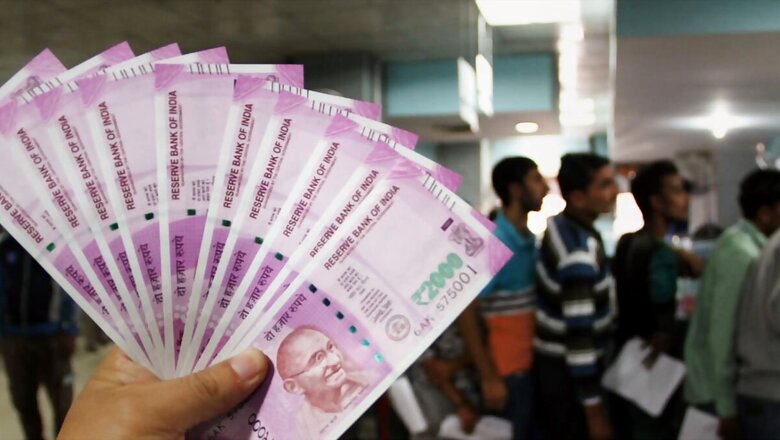
views
The Reserve Bank of India’s decision to withdraw the Rs 2,000 currency notes has come as a major blow to the narco-terrorism nexus that poses a new threat to the country’s national security.
Two recent small press releases by National Investigation Agency (NIA) skipped the headlines but are enough to give one a peek into this complex web where fake Rs 2,000 currency notes had become the life-line of this narco-terrorism nexus.
The NIA arrested three persons in a fake currency case in the second week of May from Maharashtra and specifically said that a connection to the D-Company was found. The case was first registered by the Thane police and is known as the ‘Naupada fake currency’ case. The significance of this case from the perspective of national security can be gauged from the fact that it is being investigated now by the NIA, India’s premier agency that deals with cases pertaining to national security. The fake currency seized by Thane police in this case two-years ago primarily consisted of Rs 2,000 fake currency notes.
On May 11, the NIA issued a statement that said, “The National Investigation Agency (NIA)… recovered several incriminating materials during searches at half a dozen locations in Mumbai in the 2021 Naupada case relating to seizure of high quality fake Indian currency notes (FICN). The recovery included sharp edged weapons, digital devices and documents, which is a strong corroboration of NIA’s earlier investigational findings establishing a direct connection with the D-Company in the fake currency racket. Thus the role of the D-Company has been prima facie established in the circulation of FICN in India during the NIA investigation into the case. The case related to the seizure of counterfeit Indian currency notes of Rs 2,000 denomination. Two persons were arrested in the case, originally registered at the Naupada police station, Thane City, Maharashtra on 18th November 2021, under relevant sections of IPC and the Unlawful Activities (Prevention) Act, 1967. The accused, identified as Riyaz and Nasir, both residents of Mumbai, are currently in judicial custody.”
The press release issued on May 13 said, “Two days after searches at multiple locations in Maharashtra, the National Investigation Agency (NIA) on Friday made another arrest in the 2021 Naupada fake currency case, taking the total arrests to three. The accused, Md Fayaaz Shikilkar, was taken into custody for possession of 12 sharp-edged swords and other incriminating material linking him to the case relating to seizure of high quality fake Indian currency notes (FICN). NIA investigations showed that the accused was in touch with D-company in connection with the fake notes circulation racket. Wednesday’s searches at six locations led to the NIA linking 33-year-old Mohammad Fayaaz, a resident of Mumbai, with the 2021 case, on the basis of certain material recovered from the houses and offices of the accused and suspects.”
With the involvement of D-Company, it is clear that Pakistan is playing a key role in funding this narco-terror network in India from across the border. There are credible inputs available with the security establishment of India that a substantial chunk of these currency notes are also coming through illegal drones flying to India from across the border. These are the same drones who are also being used to push narcotics in India especially in the border states like Punjab and the union territory of Jammu and Kashmir.
That Rs 2,000 is the life-line of anti-India narco-terrorism nexus becomes clear as a substantial volume of fake Indian currency has been found in the denomination of Rs 2000 notes over the last few years. While replying to a question in Rajya Sabha in December 2022, the union minister of state in the ministry of home affairs Nityanand Rai shared certain details based on the data compiled by national crime records bureau (NCRB). The data shows, relatively higher volume of fake Rs 2,000 notes were found in border states and union territories and areas affected by terrorism and narcotics smuggling. The number of fake Rs 2,000 notes found in these sensitive areas were far higher than the fake currency notes found in relatively less sensitive areas.
In 2019 the number of fake Rs 2000 notes found in Karnataka (23,599), Gujarat (14,494), Kerala (3,559), Maharashtra (6,848), Tamil Nadu (3,208) and West Bengal (13,637) was quite high and in subsequent years these number increased. The total value of fake currency seized was around Rs 25.4 crore in 2019 out of which around Rs 18 crore was in the denomination of fake Rs 2,000 notes.
In the year 2020 significant seizures of Rs 2,000 fake currency notes were registered in Maharashtra, West Bengal, Tamil Nadu, Punjab, Andhra Pradesh, Gujarat and Jammu and Kashmir. Out of a total fake currency seizure of around Rs 92 crore in 2020, around Rs 50 crore was found in fake Rs 2,000 notes. In the year 2021 this trend continued with fake Rs 2000 notes finding a major spurt in the sensitive regions.
Directorate of Revenue Intelligence (DRI), a central government agency, came out with ‘Smuggling in India Report 2019-20’ that establishes beyond doubt the significance of dealing with the issue of Rs 2,000 fake notes from the perspective of national security.
According to the report, “Cross-border trade and smuggling can have a multi-dimensional impact on national security. Apart from its traditional impacts like being used by actors inimical to the security of the state to finance their activities and sustain themselves, increasingly, the global supply chain and volume of trade is being used to mask proliferation and illegal trade in dual-use goods as genuine trade transactions. Smuggling of FICN (Fake Indian Currency Notes) is another grave security threat. In the Indian context, smuggling of Fake Indian Currency Notes (FICN) from across the border is largely state sponsored and is intended to harm and destabilise the Indian Financial system. Smuggling of narcotics and drugs has also come to be linked with terrorism. Smuggling is, nevertheless, in itself lucrative and offers high margins. It doesn’t require heavy investments in infrastructure and human resources. This makes it a preferred mode of generating finances for non-state actors.”
In 2019-20, the DRI booked multiple cases of smuggling of Narcotics along the western border and western seaboard. In one such case DRI along with the Indian Coast Guard intercepted a fishing boat off the coast of Gujarat and seized 214 kg of Heroin which was meant for smuggling into India. In another case DRI effected a seizure of 7 kg of Heroin in Kupwara and Tangdhar in Jammu & Kashmir close to the Line of Control (LoC), which had been smuggled in from Pakistan Occupied Kashmir (PoK). In June 2019, Indian Customs seized 532 kg of Heroin concealed in bags declared to be containing rock salt while they were being imported into India from Pakistan through the Integrated Checkpost at Attari, Punjab. The magnitude and modus of the cases clearly indicate attempts by inimical elements to push narcotics into India and use proceeds of such smuggling to finance anti-national activities.
And this is where the role of fake Rs 2,000 notes comes into the picture as the DRI report clearly says that FICN pose a threat to the national security of India. FICN is smuggled into India from Pakistan mostly through the land borders of Bangladesh and Nepal. “In 2019-20 Customs booked 16 cases leading to a seizure of FICN with a face value of Rs. 62.40 lakh. Bulk of the seizures comprised Rs 2,000 denomination, with Rs 500 denominations making up a smaller portion of the fake currency seized,” says the DRI report.
DRI analysis indicates that there has been a gradual improvement in the quality of the FICN being seized.
Demonetisation had dealt a heavy blow to the fake Indian currency networks. These networks have been attempting to make a comeback, but have still not reached the same scale and quality, according to the DRI.
Several news reports published in August 2022, said, quoting a reply by Minister of State for Finance Pankaj Chaudhary in the parliament that the number of fake Rs 2,000 notes seized by the government increased by 107 times from 2016 to 2020. The minister said that 2,272 fake currency notes of Rs 2,000 denomination were seized in 2016, 74,898 in 2017, 54,776 in 2018, 90,566 in 2019 and 2,44,834 in 2020.
Conclusion
It is clear that the withdrawal of Rs 2,000 notes has come as a major setback to anti-India forces as their financial life line has been crushed with this decision. The Modi government took this decision, knowing that it could adversely affect it politically but it has kept the national interest over and above the political gains. On issues of national security, the Opposition should have backed the government. National interest and petty political gains shouldn’t be the driving force of a mature political party in a democracy. In this context, it seems the Opposition still has a long way to go.
The writer, an author and columnist has written several books. He tweets @ArunAnandLive. The views expressed in this article are those of the author and do not represent the stand of this publication.




















Comments
0 comment